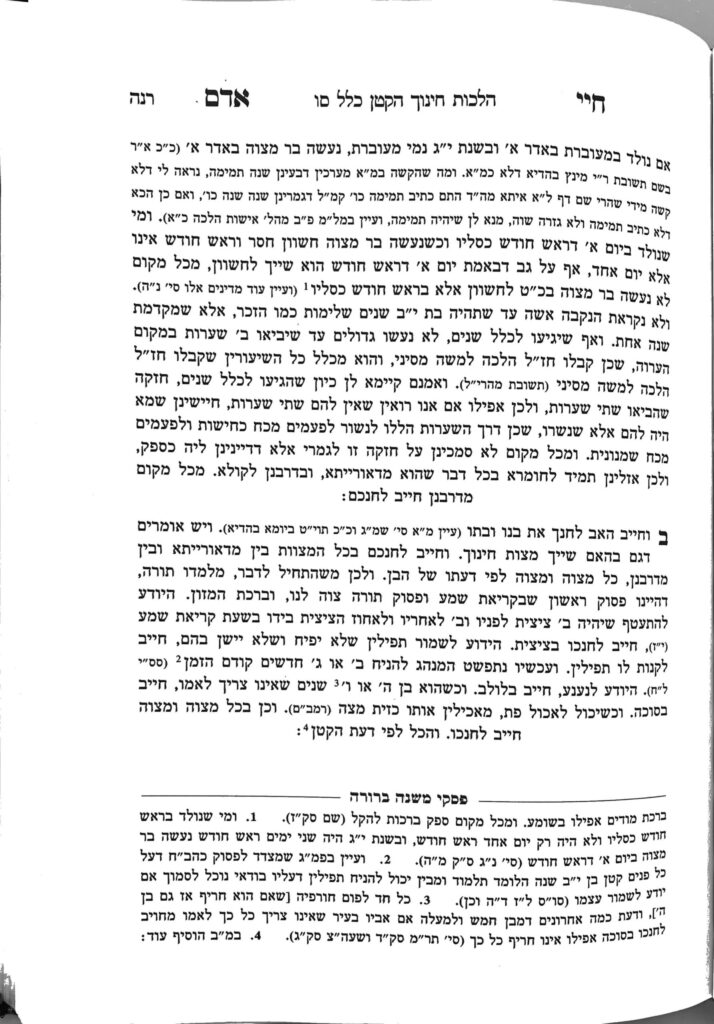We are beginning siman 2. The Chayei Adam writes that a father is chayav to be mechaneich both a son and daughter. Although the Gemara clearly states the chiyuv chinuch for a son, and the chiyuv on a daughter is less clear, the Chayei Adam paskens that the chiyuv extends to a daughter as well.
The Chayei Adam writes that there are those who hold the chiyuv chinuch applies to a mother as well. We will see later in the siman that the Chayei Adam is currently discussing mitzvos asei, and whether the chiyuv to teach the child to perform these mitzvos correctly in the future applies equally to the father and mother. The Terumas Hadeshen paskens that the chiyuv applies equally to both parents, while the Tosfos Yeshanim understands it only applies to the father. The Magen Avraham paskens like the Tosfos Yeshanim, and the Mishnah Berurah uses the same language as the Chayei Adam, that there is a chiyuv on the father, and some hold there is a chiyuv on the mother, but does not bring down a dissenting opinion..
We need to understand the nature of the mother’s chiyuv that is being debated. It goes without question that a mother teaches their child, as it says toras imecha (MIshlei 1:8) of a mother; i.e., the modeling and natural instinct that a mother imparts to her child by definition. The question is whether her chiyuv is parallel to the that of the father, or whether there is any difference.
Rav Reuven Grozovsky ztl, in his Chidushim to Maseches Sukkah, discusses this question regarding the Gemara which relates that Hilani Hamalka sat in a sukkah with her children who were katanim, and points out that the Gemara concludes that she was sitting in the sukkah for her children’s sake. Thus, the Trumas Hadeshen concludes that a mother must have some level of chiyuv chinuch, because otherwise Hilani Hamalka would not have sat in the sukkah with her children.
We know that the father recites the bracha of baruch shepitrani when the child reaches bar mitzvah. This teaches us that not only is the father responsible for chinuch, but he is held culpable if he is unsuccessful (hence he recites the bracha to demonstrate that he is no longer culpable). The mother has a chiyuv to train and teach her children, as do any members of klal yisroel, but is not held culpable if unsuccessful.
Rav Reuven takes this concept a step further, writing that the father takes on the responsibility of ensuring that the mitzvos happen. He explains that the question is raised whether the child has a chiyuv chinuch on himself. The question depends on whether Chazal can place a chiyuv on someone who is not able to chayav themselves (because they are a katan). Tosfos understands that a child is chayav miderabanan. Rashi disagrees, and holds that the chiyuv is only on the parents. Rav Reuven suggests that according to Tosfos, the chiyuv is shared, so to say, between father and child: the child has to do the mitzvos, and the father has to ensure that he does them. Therefore, as the father actually shares the chiyuv with the child, he is held culpable if the chinuch is unsuccessful.
This is different than most situations, where one is generally not obligated to see the big picture of where someone is headed. Someone may not be doing mitzvos properly, or not have the best of middos, yet as long as they are not actively committing averios, the obligations of areivus (responsibility) and tochacha do not apply. Regarding chinuch, the father has an active responsibility to ensure the child performs the mitzvos properly, and is set on the path to continue to perform them properly throughout their life. It is this level of chiyuv which the mother may or may not be responsible for, but all poskim agree that she is chayav in the general chiyuv to model and be mechaneich her child.
Summary
A mother and father have a chiyuv chinuch for both their sons and daughters. However, the father’s chiyuv is somewhat stronger than the mother’s, in that he is held responsible if the chinuch is unsuccessful.



